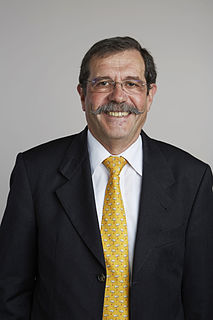A Quote by Martin Fleischmann
The problem is that replacement of Quantum Mechanics by Quantum Field Theory is still very demanding.
Quote Topics
Related Quotes
When the province of physical theory was extended to encompass microscopic phenomena through the creation of quantum mechanics, the concept of consciousness came to the fore again. It was not possible to formulate the laws of quantum mechanics in a fully consistent way without reference to the consciousness.
I've been very involved in this quantum holographic formalism and helping to explore it as explanatory of the very root of our perceptual capabilities. It is postulated, for example, that this very basic entanglement, at the quantum level, at the level of subatomic matter, is really a part of quantum mechanics.
String theory is the most developed theory with the capacity to unite general relativity and quantum mechanics in a consistent manner. I do believe the universe is consistent, and therefore I do believe that general relativity and quantum mechanics should be put together in a manner that makes sense.
'Participant' is the incontrovertible new concept given by quantum mechanics. It strikes down the 'observer' of classical theory, the man who stands safely behind the thick glass wall and watches what goes on without taking part. It can't be done, quantum mechanics says it...May the universe in some sense be 'brought into being' by the participation of those who participate?
In quantum mechanics there is A causing B. The equations do not stand outside that usual paradigm of physics. The real issue is that the kinds of things you predict in quantum mechanics are different from the kinds of things you predict using general relativity. Quantum mechanics, that big, new, spectacular remarkable idea is that you only predict probabilities, the likelihood of one outcome or another. That's the new idea.



































